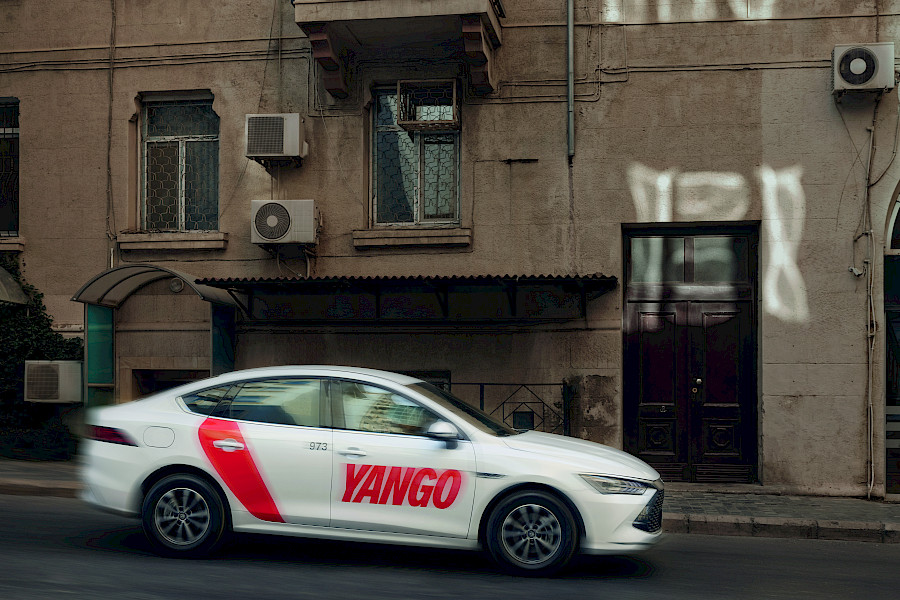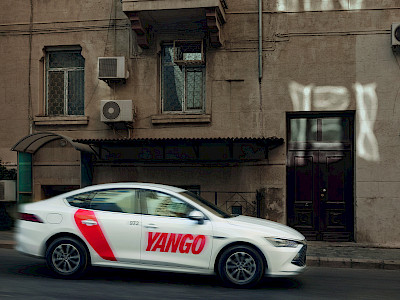
The technology company Yango Group, headquartered in Dubai, entered the Azerbaijani market two years ago, starting with the Yango Ride taxi-ordering service, which quickly gained popularity. Today it is no longer just a taxi service, but a full-fledged super-app that integrates a range of services, simplifying everyday tasks, such as travelling, food delivery and more.
In this interview with NARGIS Magazine, Mushvig Hasanov, Director of Yango Ride in Azerbaijan, discusses the challenges the platform faces in the market, the factors that help the company develop its services, and how it creates a local product.

You worked at a classified service and then at Uber. In 2022, you joined the Yango Ride team. How has your background helped in your work, and what are your current responsibilities?
My experience in the classified service can be considered as the school of analytics. It was there that I learned how to handle large volumes of data, identify patterns, and understand the people and their needs behind the numbers. At Uber, I realised the importance of not only developing a strategy but also being able to adapt and scale the business processes that underpin those strategies. At Yango, I have been able to strike a balance between these skills. Currently, I am involved in the strategic development of Yango Ride's online taxi booking service in Azerbaijan, coordinating the team's work within the market, and managing interactions with partner taxi parks.

You are part of the technology company Yango Group. Can you tell us more about what else the company does?
When Yango was founded in 2018, it began as a simple online taxi booking service. The first markets were Côte d’Ivoire in Africa and Finland in Europe.
In Azerbaijan, for example, in addition to the taxi service, we have launched restaurant meal delivery, food delivery, and logistics services. In other regions, such as the Middle East, we are developing Yasmina, a bilingual AI assistant, and the entertainment platform Yango Play, which offers music, series, and TV channels in Arabic. Additionally, our car rental service, Yango Drive, is operating in the UAE, where customers can rent vehicles, including the highly acclaimed Cybertruck. In Latin America and Africa, we’ve also launched a classified platform for buying and selling goods. As you can see, each market tells its own unique story, and we understand how to tailor our services to meet the specific needs of each country.
In just six years, Yango has transformed from a company with a single product into an ecosystem offering a wide range of services across more than 30 countries in the Middle East, Europe, Africa, and beyond.

How does Yango adapt its services to different markets? Could you share some examples?
At Yango, we don’t believe in a one-size-fits-all approach. Every country and city is unique, and generic solutions don’t always work. In Azerbaijan, where I oversee the development of Yango Ride, we continuously adapt the service to align with local events and needs. For instance, during the renowned COP29 event in the autumn, our team introduced a special fare in the app, organised additional training for drivers, developed airport navigation for visitors, and created designated pickup zones with promoters around the city. Similarly, for the Formula 1 event in Baku, we incorporated a feature into Yango that shows real-time road closures and convenient points for ordering a taxi. Our team even maps out the city’s restrictions in the system each year. During this period, we also introduced the "Fastest" option, allowing passengers to quickly locate the nearest available car, even in heavy traffic. This feature turned out to be very popular, so we decided to keep it in the app.
This hyperlocal approach applies across all our markets and services. For example, motorcycle taxis are popular in Latin America, and rickshaws are commonly used in Pakistan. We launched these services on Yango in due course and continue to run promotional campaigns to increase their use.
Yango super-app is tailored to each country. While the overarching goal is the same everywhere – to help people with their daily tasks – the services, their functionality, and even the interface are customised to meet local demands.

Can you tell us more about how the Azerbaijani market differs from others?
Azerbaijan is one of our most dynamic markets, where new products are embraced with enthusiasm. In the past year alone, we have launched several new services: Navigator, which helps motorists plan routes considering city traffic and congestion; grocery delivery; restaurant meal delivery; and Transport, a service that assists with public transport planning and bus arrival tracking. The results speak for themselves: for example, in december, more than 80,000 people used Transport in Baku—50% more than in the fall. And this is just the beginning.
For example, it was here that we introduced the loyalty programme for drivers and the option for instant payments. Another idea was also born in Azerbaijan, which is now working in some other countries – to create different conditions for drivers, under which they can carry out orders, and to give them a choice. Of course, such a development would not have been possible without our partner taxi companies. They have a great sense of the market and promptly share feedback. This is how new experiments and projects are born.
Our team in Azerbaijan often serves as a testing ground for successful solutions that are later implemented in other markets.
There have been many changes in the taxi market in Azerbaijan over the past year, including stricter regulations and new driver requirements. How has this affected your strategy and business overall?
In response to these changes, we launched a programme last spring to help our partners update their cars and comply with the new regulations. To support this, we established partnerships with banks and car dealerships, providing taxi fleets with favourable lending and leasing conditions. In just one year, we, along with our partners, put over 3,500 new vehicles, including hybrids, on the road, and we plan to add another 5,000 this year.
We are also working closely with government agencies to increase the number of licensed drivers. We’ve made the necessary improvements to our service and introduced a bonus programme for drivers with licensed cars. This is already yielding results: the number of user complaints about incorrect cars arriving has decreased, making up less than 1% of feedback in the app.
At the same time, it’s important to support our drivers. For example, we recently held a lottery where a driver won a new car. We regularly organise such initiatives to provide additional motivation for drivers. Moreover, in the summer, we launched the "Drivers’ Dreams" project, where drivers can share their dreams in their profiles. This not only gave us a better understanding of our drivers but also increased the volume of tips.
One remarkable thing is that, despite changes in the taxi market, it’s becoming more profitable for investors willing to buy cars. The average payback time is about two years, which is relatively rare in many other industries. This opens up new opportunities for growth and improves the overall quality of service in Azerbaijan.

What other challenges do you face in your work?
The online services industry presents a constant array of challenges. The landscape evolves rapidly, which is both a challenge and a source of motivation. It’s crucial to stay in tune with the industry, maintaining close communication with partners, drivers, and passengers, and truly listening to their needs. This is why I make it a point not to remain confined to the office but to regularly "go into the field" and drive myself. At our company, we refer to this as "Go to the Fields" – an initiative that allows any employee, regardless of their position or location, to experience working as a driver or courier, provided they submit the necessary documentation.
These initiatives not only provide a deeper understanding of how our services operate but also reveal areas for improvement. By identifying where we can make the process more convenient, quicker, and more efficient, we ensure continuous enhancement. For example, during my first experience as a driver, I noticed that the registration process took nearly an hour for document verification and the assignment of the first order. This was clearly inconvenient for drivers, as time is money, and also detrimental to our company, as it negatively impacted the overall user experience on our platform. As a result, I worked with the team to find a solution, and now, the time from document verification to receiving the first order has been reduced to no more than 10 minutes.
In another instance, I drove a group of tourists to the airport, and they accidentally left their phone in the car. In a real-world setting, amidst a steady flow of orders, handling this situation proved more difficult than anticipated. I initially struggled to figure out the best way to return the phone to them.
This experience led us to introduce regular memos for drivers, providing clear instructions on what to do if they find lost items in their vehicles.
Finally, tell us about the team behind Yango Ride in Azerbaijan.
Globally, Yango Group employs several thousand people, and in Azerbaijan, I manage a Yango Ride team of 130 people, including operational specialists, marketing managers, support staff, and more.
We are constantly creating jobs and investing in the development of talent in the market. There are inspiring examples of team members who have made dramatic career changes within the company. Some started in customer support and later moved into departments working with partners or developing new services. This is particularly important because I believe that people who begin "from the bottom" understand how to build long-term relationships with partners.
I value initiative and openness – these are the foundations of Yango Group’s culture. Every employee is encouraged to express their opinions, propose ideas, and take responsibility for their implementation. I actively support this within the team, and it has proven to be an effective approach, allowing us to test new solutions and develop products that truly meet the needs of the people in our cities and countries.




